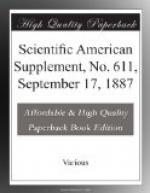With his wife, Lady Anne, he dwelt with the different tribes of the desert, studying the Arabs as a people, in their customs and habits, also traditions with beliefs. In matter of their horses, Mr. Blunt made a special study, while Lady Anne put her diaries in book form after her return, and which book should be owned by every cultured and educated lady in America. After spending a year in Arabia, traveling both sides of the Euphrates and through Mesopotamia, as no other Anglo-Saxons have been known to do, living with the different Bedouin tribes of the desert as they lived, Mr. Blunt and his wife, Lady Anne, came out with sixteen of the choicest bred mares to be found, also two stallions, the mares mostly with foal. These were placed upon their estates, “Crabbet Park,” to continue inbreeding as upon the desert, pure to its blood. As this question in itself will make a long and interesting article, I will avoid it at present, quoting to the reader from one of my old letters:
“CRABBET PARK, SUSSEX, ENGLAND.
“Dear Sir: Political
matters have prevented an earlier reply to
your last.
“I am well satisfied
with my present results, and shall not
abandon what I have undertaken.
The practical merits of Arabian
blood are well understood
by us.
“Our sale of young stock maintains itself in good prices in spite of bad times; indeed, my average within the past two years has risen from L84 to L102 on the pure-breds sold as yearlings, and we receive the most flattering and satisfactory accounts from purchasers, although it is known that I retain the best of each year’s produce, and so have greatly improved my breeding stock.
“You speak of the opinions of the press as against you. The sporting press are not breeders, but are the mouthpiece of prejudices. We have had them somewhat against us, but they now view things in more friendly tone.
“For immediate use in running races (in which the sporting press are chiefly interested), the Arabian in his undeveloped state and under size will not compete with the English race horse. This fact has caused racing men to doubt his other many and more important merits; indeed, it is only those who have had personal experience of him that as yet acknowledge them.
“The strong points in the Arabian are many:
“First, his undoubted soundness in constitution, in wind, limb, and feet. It will be noticed that the Englishman must have soundness in wind, limb, and feet, showing that their thoroughbred is the thorn in that particular. The Arabian has also wonderful intelligence, great beauty, and good disposition, with an almost affectionate desire to adapt himself to your wishes.
“In breeding, I have found the pure-breds delicate during the first few weeks after birth, and have lost a good many, especially




